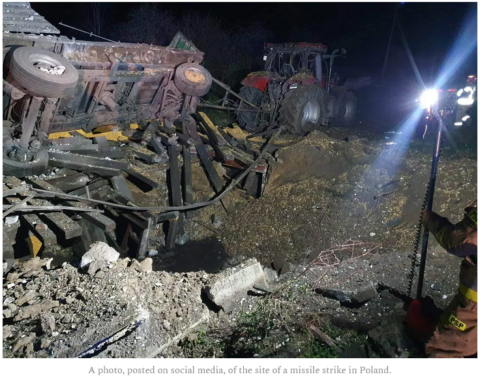In The Line, what Matt Gurney calls a “surprise fire drill” for a potential nuclear war:
Those with any memory of the Cold War probably got a bit of a cardio workout even if they were sitting still earlier this week when Polish news sources, which were quickly matched by American ones, reported that a Russian missile had landed in Poland, killing two civilians. An armed attack by Russia, in other words, on a NATO member state, even if a likely accidental one — Russia was bombing targets in Ukraine at the time and the site of the Polish blast was quite near the border with its embattled neighbour.
Still. Oops.
It didn’t take long before doubt emerged. At present, the official theory offered by Poland and accepted by NATO is that the missile that killed the two unfortunate Poles was actually a Ukrainian air-defence missile that was fired at incoming Russian missiles in self-defence. It somehow malfunctioned and landed in Poland. The Ukrainians themselves seem unconvinced and there are certainly those wondering if a wayward Ukrainian missile is a cover story to de-escalate a Russian mistake. Personally, I’d guess no. It probably was a Ukrainian missile. And if it is all a cover story in the cause of keeping tension between Moscow and the West at a low-sweat stage, I can live with that, for now.
The point isn’t for me to pretend I’m a munitions expert, capable of instantly solving the case with only the briefest glance at photos of a fragment of twisted missile debris. It’s more to consider what this event felt like, and what it easily could have been: one of the scarier scenarios Western officials and analysts have been worried since this war began nine months ago — accident kicking off a conflict neither side wanted but neither will back down from once it’s begun.
This isn’t a new fear. It was a fear during the Cold War. And a justified one. At several points during that long standoff, technical malfunctions or political miscalculations raised the danger of a nuclear war to horrifying levels. On a few occasions American defense commanders wrongly believed that the Soviets were launching an attack; luckily for everyone, the Americans had redundancies and were well trained and cooler heads always prevailed. In 1983, Soviet satellites reported the Americans were firing ballistic missiles at the Soviet Union. Tensions were high at the time and the Soviets had decided to launch a full strike on the West as soon as any NATO launches were detected. But Lieutenant Colonel Stanislav Petrov, a relatively low-ranked Soviet officer working the night shift, concluded that the warnings were probably a glitch — it didn’t make sense to him that America would open a surprise attack with a handful of missiles instead of the full arsenal. Rather than pass on a warning that would have triggered Soviet launches against NATO, he reported that the launch detections were a technical malfunction in the Soviet equipment. He did that again when further launches were detected. Lt. Col. Petrov then spent a few long and anxious minutes waiting to see if any NATO nuclear weapons exploded over targets in the Soviet Union. Waiting to see what happened was the only way the colonel could know if he’d made the right call, or a very, very bad one.
He was right, of course. It was a glitch. New Soviet satellites were being tricked by sunlight bouncing off clouds at high altitude. But for a few minutes, the fate of the world hung on one mid-ranked Soviet officer’s middle-of-the-night judgment call.
These real-life examples are horrifying. But learning of them never hit me quite as hard as the fictional scenario portrayed in the 1962 film Fail-Safe. Released around the same time as the more famous Doctor Strangelove, Fail-Safe, adapted from the novel Red Alert, was a grimly serious counterpart to Kubrick’s dark comedy. With an all-star cast that includes Walter Matthau and Henry Fonda, Fail-Safe depicts a series of small accidents that result in a group of American bomber pilots concluding that they have been ordered to conduct a retaliatory strike on the Soviet Union. There is no war. It’s entirely a misunderstanding, a fluke of American technological glitches and Soviet jamming. But the American pilots, trained to expect Soviet tricks and lies and to accept no order to abort (as such an order could be faked) relentlessly bore in on their targets, truly believing that they are avenging a Soviet strike on America.




